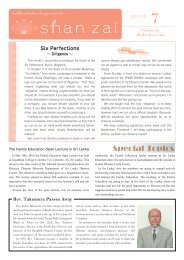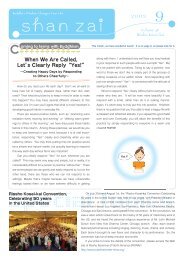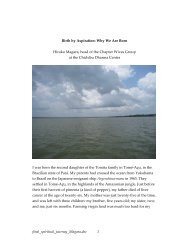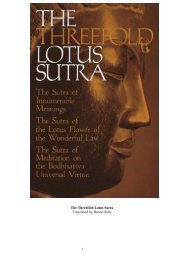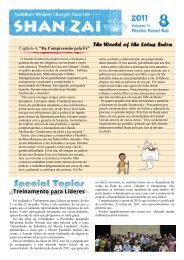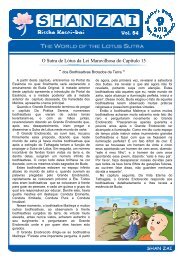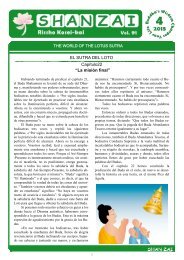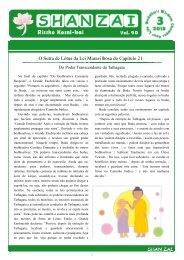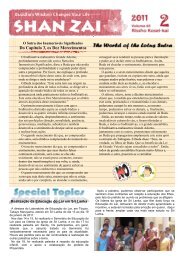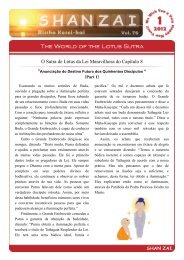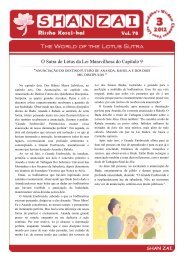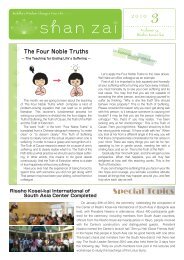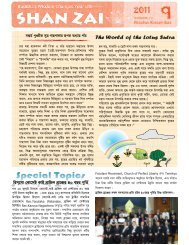Create successful ePaper yourself
Turn your PDF publications into a flip-book with our unique Google optimized e-Paper software.
"All Work Is <strong>the</strong> Buddha's Work"Everyone realizes that it is important <strong>to</strong> be deeply immersed in something. But some peopletake it in<strong>to</strong> <strong>the</strong>ir heads <strong>to</strong> do first one thing and <strong>the</strong>n ano<strong>the</strong>r, and end up obtaining nothing atall. That is truly regrettable, because if <strong>the</strong>y could just live <strong>the</strong>ir lives absorbed in one interest<strong>the</strong>y would be able <strong>to</strong> accomplish great things.I have heard that <strong>the</strong>re is a saying in America, "Never buy a car made on a Monday."Apparently, <strong>the</strong>re is a greater chance that a lemon with loose nuts and bolts will be producedon a Monday, because workers tend <strong>to</strong> slack off after <strong>the</strong> weekend. Slackness is not, of course,limited <strong>to</strong> <strong>the</strong> United States. The commenta<strong>to</strong>r Naoki Komuro wrote in his Sobie<strong>to</strong> Teikoku noHo<strong>kai</strong> (The Collapse of <strong>the</strong> Soviet Empire):In <strong>the</strong> Soviet Union when one purchases a household appliance, one always tries <strong>to</strong> select onecertified <strong>to</strong> have been made during <strong>the</strong> first half of <strong>the</strong> month. If it is made in <strong>the</strong> first half, youcan rest assured that it was not made in a rush. You can assume it will work. But if it was madein <strong>the</strong> latter half of <strong>the</strong> month, <strong>the</strong>re is a possibility that it will fall apart ra<strong>the</strong>r quickly.The Russian worker thinks only of achieving <strong>the</strong> assigned quota, so in <strong>the</strong> first half of <strong>the</strong> monthhe works slowly. Then, in <strong>the</strong> second half, he hurries under pressure <strong>to</strong> reach <strong>the</strong> quota.Everyone knows <strong>the</strong> situation, so <strong>the</strong>y try <strong>to</strong> buy <strong>the</strong> "early half" products.The Americans' slipshod method and <strong>the</strong> Russians' rushed way of manufacturing show acommon lack of enthusiasm for fac<strong>to</strong>ry work. Without dedication, good workmanship canhardly be expected.Japanese people are ra<strong>the</strong>r disposed <strong>to</strong> concentrate on <strong>the</strong>ir work. That Japanese products areknown <strong>to</strong> be efficient, unlikely <strong>to</strong> break down, and long‐lasting is because of workers'dedication. This may be partly a national trait, and I think <strong>the</strong> influence of Buddhism issignificant. Buddhism places great emphasis on samadhi, remaining tranquil whatever happensand focusing one's thoughts on a single object. Though it was originally a Buddhist asceticpractice, Mahayana Buddhism teaches its application in all aspects of daily life, including workand study.The Japanese most noted for advocating <strong>the</strong> application of samadhi in daily life was SuzukiShosan (1579‐‐1655), a learned priest of <strong>the</strong> So<strong>to</strong> Zen sect who served under <strong>the</strong> great feudalwarrior chieftain Tokugawa Ieyasu. In <strong>the</strong> section "The Daily Business of Farmers" of his moralessay Bammin Tokuyo (For <strong>the</strong> Benefit of All), Shosan writes:Heaven set farmers <strong>the</strong> vital task of nourishing <strong>the</strong> world and its people. If <strong>the</strong>y work <strong>the</strong>irfarms in diligent accordance with <strong>the</strong> Way of Heaven, with no thought of <strong>the</strong>mselves; if <strong>the</strong>yproduce <strong>the</strong> five grains and worship <strong>the</strong> Buddha and <strong>the</strong> gods; if <strong>the</strong>y make a great vow <strong>to</strong> savelives and provide enough food even for <strong>the</strong> insects; if <strong>the</strong>y invoke <strong>the</strong> name of Amida Buddhaeach time <strong>the</strong>y sink <strong>the</strong>ir hoes in <strong>the</strong> ground; if <strong>the</strong>y put <strong>the</strong>ir hearts in<strong>to</strong> each stroke of <strong>the</strong>irscy<strong>the</strong>s: <strong>the</strong>n <strong>the</strong> fields in which <strong>the</strong>y labor will be holy ground, and <strong>the</strong> grain <strong>the</strong>y produce willbe holy food. For those who eat it, it will be like a medicine that dispels and vanquishesdelusion.If <strong>the</strong>y invoke <strong>the</strong> name of Amida with each stroke of <strong>the</strong> hoe or scy<strong>the</strong>, <strong>the</strong>y will not bedistracted and will be able <strong>to</strong> concentrate; <strong>the</strong>y will be in a state of profound meditation as <strong>the</strong>y35



